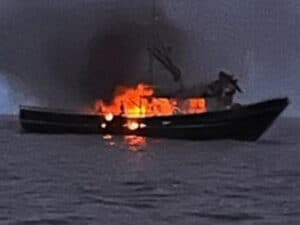
VIDEO: NYK claims a world first in autonomous ship operation
Written by Nick Blenkey
Route navigated using Sherpa system
Japan’s NYK Line has conducted what it says is the world’s first Maritime Autonomous Surface Ships (MASS) trial to be performed in accordance with the IMO’s interim guidelines such trials.
NYK’s goal is to operate autonomous ships that will be manned, but make use of advanced technologies and remote support from shore to support ship operation and enhance safety. as the company begins tests to realize its target of manned autonomous ships.
In the MASS trial, from September 14 to 17, Iris Leader, a large NYK-operated PCTC with a gross tonnage of 70,826 tons, was navigated day and night using the Sherpa System for Real ship (SSR) navigation system on a voyage from Xinsha, China, to Nagoya, Japan, and then from the port of Nagoya to the port of Yokohama, Japan.
Crew performed typical duties during the navigations, which included Japan’s coastal area but excluded bays.
The Sherpa System for Real ship (SSR) navigation navigates a vessel by calculating optimal routes based on environmental conditions.
During the trial, the SSR’s performance in actual sea conditions was monitored as it collected information on environmental conditions around the ship from existing navigational devices, calculated collision risk, automatically determined optimal routes and speeds that were safe and economical, and then automatically navigated the ship.
Using data and experience gained through this trial but not obtainable through onshore simulators, NYK was able to ensure the feasibility of the SSR and its benefit for safe and optimal operations.
NYK says the trial was a big step toward realizing its goal of manned autonomous ships.
But unmanned ships may also be in NYK’s thoughts. It says, “the SSR verified by this trial will also be applied to future coastal ships, which currently face serious crew shortages,” adding that the SSR can become a basic technology for remote and unmanned navigation.




